Georgetown Named the No. 1 Producer of Fulbright Student Awardees for the Second Year in a Row in 2023-2024
For the second year in a row, Georgetown students and alumni won the highest number of Fulbright scholarships out of any other U.S. college and university for the 2023-2024 academic year.
The achievement comes after Georgetown produced the most Fulbright student scholars out of any educational institution last year. Over the last six years, Georgetown has been named the top producer for the Fulbright U.S. Student Program four times.
“I wish to offer my sincere congratulations to these 40 members of our community. These students and alumni have demonstrated an extraordinary commitment to excellence and service,” said Georgetown President John J. DeGioia. “This is a wonderful honor for each of them and for our University, as we seek to deepen our engagement around the world and our role as a global institution.”
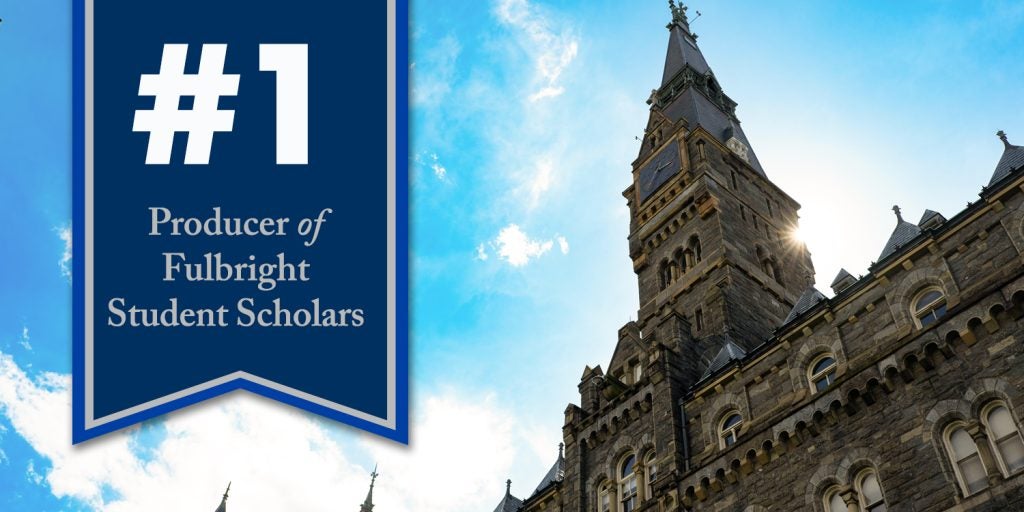
Every year, the Fulbright U.S. Student Program selects outstanding American students and professionals to study, teach and pursue research projects abroad to exchange ideas, promote intercultural connections and tackle global issues.
Of the Georgetown students and alumni who applied in October 2022, 40 Hoyas were selected in 22 countries for the 2023-2024 academic year. Georgetown’s current cadre of Fulbright scholars joins the ranks of over 500 Hoyas who have been selected for the program throughout the university’s history.
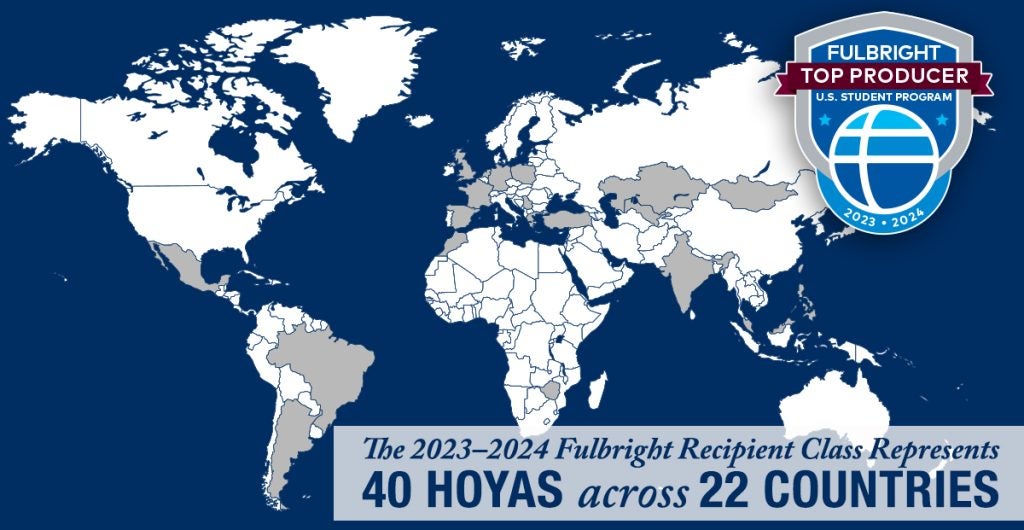
Georgetown’s Fulbright recipients work extensively with the staff at the Center for Research and Fellowships (CRF) to prepare for their applications and interviews. The CRF also connects applicants with a community of faculty, alumni and staff volunteers who mentor the students through their Fulbright process.
“It is rewarding that Georgetown has been recognized again as the top producing institution for the Fulbright program. My colleagues and I are inspired by the thoughtful applications and dedication we see every year, and we congratulate each recipient,” said Bill Cessato, deputy director of the CRF. “We hope all eligible Hoyas, particularly as we seek to advance a shared commitment to diversity and inclusion, will view our center as a resource for putting together strong Fulbright applications to take part in transformative experiences around the world.”
This year’s Fulbright awardees come from diverse academic backgrounds and represent Georgetown’s College of Arts & Sciences, Graduate School of Arts & Sciences, Walsh School of Foreign Service, School of Health and School of Continuing Studies.
Immersing in Persian and Uzbek Culture in Uzbekistan
As an Iranian American, Nima Majidi’s (SFS’23) Persian heritage has always been a big component of his identity. Majidi spoke Persian with his family growing up, and his parents instilled in him a strong set of Persian values. His deep fascination and connection to Persian culture was a significant factor in choosing to go to Georgetown. As a Hoya, he took Persian language classes, worked for the Persian Studies Program and served as president of Georgetown’s Iranian Cultural Society.
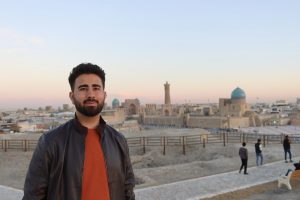
Majidi wanted to dive deeper into his Persian studies and heritage after graduating. After first learning about the Fulbright and the English Teaching Assistant Program (ETA) as a junior — and learning about Uzbekistan in one of his business classes — he began to think more seriously about applying to the program to teach English in the Central Asian country, where many Uzbeks speak Uzbek and Tajik, a close relative of the Persian language.
“I think an ETA is a unique opportunity to immerse yourself in the local community here. Being an ETA is very much an exercise in building community,” he said. “I eat like an Uzbek. I speak Uzbek. I try to buy as many of my clothes from local places and constantly try to do things as if I were a local living here.”
As an ETA in the city of Bukhara, Majidi has spent the last few months immersing himself in all that Uzbekistan has to offer.
“My first time walking through the old city in Bukhara, I saw these gorgeous buildings. I heard music playing with people walking in the streets,” he said. “Bukhara was a Silk Road town, so you can still go into the trading domes, and there are still people selling the same wares that their families did generations ago and on the same routes people took on the Silk Road. Just walking through that, it was a little bit of a ‘I don’t think we’re in Kansas anymore moment.’”
Majidi spends much of his days teaching in the city of Bukhara at a pedagogical institute, a training center for aspiring teachers in Uzbekistan. He currently teaches English to over 100 students. Last semester, Majidi also got to put his degree from SFS to work while teaching history and international relations.
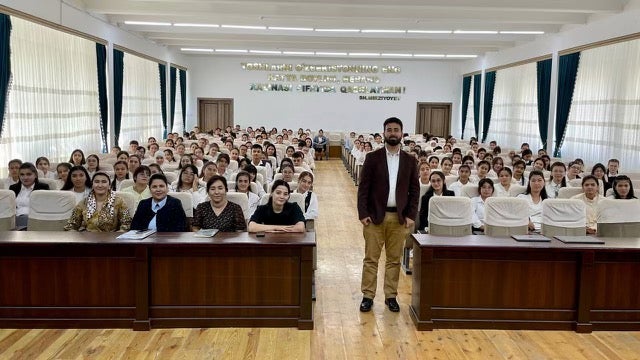
At his school, Majidi also moderates English conversation and speaking clubs for students to refine their language skills. This semester, he is also working with underprivileged students from local Uzbek villages as part of the Access program aimed to equip students with the tools to compete for better jobs and educational opportunities.
Outside of the classroom, Majidi also takes time to mesh into the local community. An avid chess player, he enjoys taking his chess set into a park in Bukhara’s old city district and inviting strangers to play while buying them a cup of tea.
Majidi said that his coursework in the Business and Global Affairs Program jointly offered by SFS and McDonough School of Business was invaluable in showing him the big picture and giving him a breadth of knowledge from international relations to politics and history. Now deep into his time in Uzbekistan, he’s been able to zoom in on what he’s learned and better understand the unique cultural context inside Uzbekistan.
“It’s really helped me personalize my study and understand the impact of what it is that I have learned and what it is that I practice,” he said. “The zooming-in effect has been so important to me and has just opened my eyes to what else is there in the rest of the world.”
From a Cold Email to a Fulbright in Greece
As a Georgetown student, Anya Howko-Johnson (SFS’22) discovered her academic interest in the intersection of climate change, international law and migration. While studying these issues during her junior year, she read an article authored by Emmanuella Doussis, a scholar based at the National and Kapodistrian University of Athens.
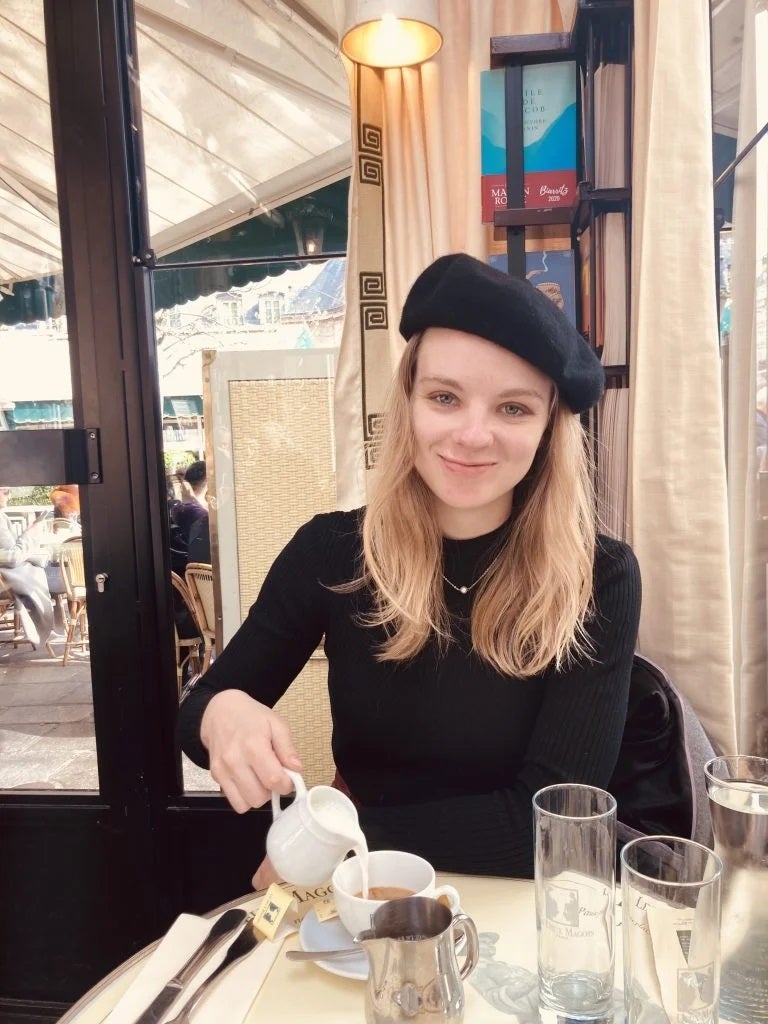
She knew immediately she wanted to work for Doussis and sent her a cold email pitching her research interests and the possibility of doing a Fulbright with the Greek scholar.
“I just did a deep dive into [the professor] and found she’s an incredibly fascinating person. She’s the UNESCO chair for climate diplomacy. She’s taught all over the world. I thought this is someone I really want to work with,” Howko-Johnson said. “I love Greece. I grew up a little bit obsessed with the Greek gods, Percy Jackson, Mamma Mia! It seemed like a fantastic confluence of all of my personal and professional interests.”
Howko-Johnson is now five months into her Fulbright program working with Doussis in Athens. She said she’s loving every minute of it and enjoys the freedom to pursue her scholarly interests outside of assigned coursework or a class.
“The Fulbright presents a unique opportunity to study only the things I am interested in without any external expectations,” she said. “So while I’m studying here, I’ll be reading an article and reading the news and I’ll say, ‘I think this is a really important issue I want to follow up on.’ And I just get to do that. I get to pursue my own intellectual interests and really stretch myself and grow as a researcher … I’m not constrained by a class.”
Through her research, Howko-Johnson has met with Greek and international policymakers who deal with climate and migration issues. On top of her research, she also interacts with students at the university, leading discussion groups in Doussis’ graduate seminar class.
Howko-Johnson has come a long way since first studying climate change and migration on the Hilltop. She said that her Georgetown education has given her the ability to think critically about a multitude of policy issues from an international perspective. She specifically noted how her participation in the Centennial Labs — SFS experiential courses that drill into a granular challenge or idea — molded her research interests today.
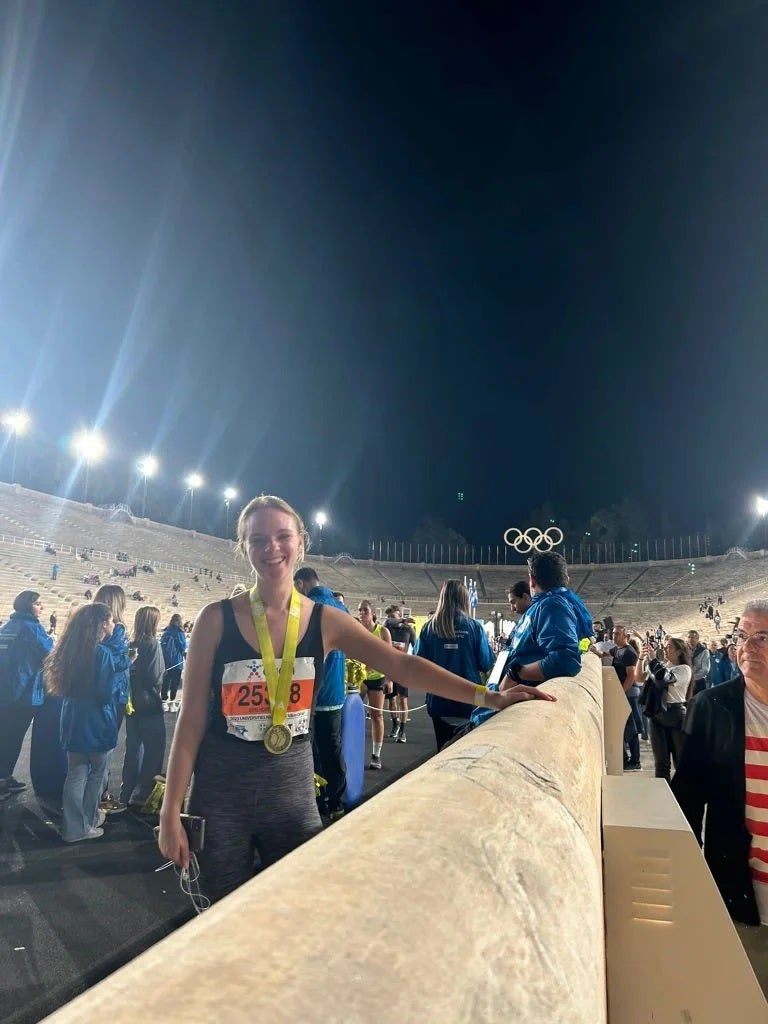
In her class, Howko-Johnson went to the U.S.-Mexico border and met with migrants, many of whom were trying to enter the U.S. after devastating storms ravaged their farms and homes and left them with few options. She said that she’s particularly interested in climate migration because there’s a gap between the severity of the issue and the amount of research and policy solutions currently available.
Since arriving in Athens, Howko-Johnson’s interests have turned more toward climate adaptation policy, which seeks to not only mitigate the climate crisis but also make positive gains despite the effects of climate change.
“It’s called climate adaptation policy, so rather than just understanding the crisis, it’s learning how to manage it. Rather than looking at climate migration as only a problem, looking at it as a potential solution,” she said. “So if people are going to have to move, if we know there are going to be disasters, how can that be a positive thing, and how can it contribute to economic growth, equality and positive international relations?”
Howko-Johnson is excited to continue her research in Greece as she also prepares to go to law school. Wherever she goes, she knows that she’ll keep her Fulbright experience and the lessons she’s learned close to home — like making her more resilient and adaptive, and exploring newfound interests.
“I’ve discovered things like an interest in the energy transition and energy security that I think I want to carry with me into future jobs. It has started to open my eyes to new possible career paths, and I’m really grateful for just that space and opportunity.”
This article was originally published by Georgetown University. Please follow the link to read the full story.
